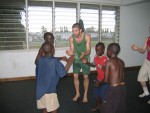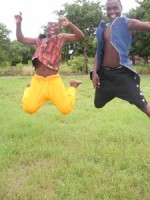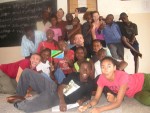Title
We have all been told before that it only takes one person to create change in the world. This past summer, four of my classmates and I were able to discover how much truth that comment holds and how change is possible through the performing arts.
Facilitators pose with participants for a group photo at the Multi-Purpose Training Center in Bunju on their last day.
(Photo by Sumaya Jackson)Collin Baj and boys from the Kigogo Center rehearsing at the Tanzanian Cultural Center.
(Photo by Alaina Williams)Body
This year’s convocation was a very special experience for me and the other members of the Dogodogo Project, because we were able to share an extremely intimate and beautiful experience with the rest of The Juilliard School. About a year ago, a group of dancers in the class of 2006 traveled to Peru and returned with great stories and pictures that they, too, shared at the beginning of the school year. Sitting in the Peter Jay Sharp Theater, I was incredibly moved and inspired, which led me to act on my own desire to do something of the same nature. As many of you know, we spent three weeks this summer in Dar es Salaam, Tanzania, teaching children dance. Having the chance to work with those less fortunate and share the power of our art was a passionate and life-altering experience that none of us will ever forget. I hope that seeing how a fourth-year dancer from New York accomplished something on a global level will convince you that anyone is capable of accomplishing great things through his or her art form.
I have been traveling to Tanzania (on the east coast of Africa, bordering Kenya) to visit my mother’s family since I can remember. My time was spent mostly visiting family and relaxing. Once I got older, I became aware of Tanzania’s large economic gap; in Dar es Salaam alone, there are 3,000-5,000 children roaming the streets. After seeing what Amelia Uzategui Bonilla did last year in Peru, I began developing the Dogodogo (Swahili for “young ones”) Project. I contacted my aunt and told her about my wanting to work with children and teach dance. She knew of a lady named Sister Jean Pruitt who had helped create the Dogodogo Center, which is dedicated to empowering street children between the ages of 7 and 17.
I put together a great team that consisted of my classmates Collin Baja, Brett Perry, Adam Weinert, and Alaina Williams. We worked together to do research; write a grant; create schedules, activities, and a budget; raise funds; write letters; and create dance works to bring with us. Our aim was to collaborate with orphans of the Dogodogo Center through a three-week residency focused on teaching contemporary dance, improvisation, and dance as a means of therapy.
We arrived in Dar es Salaam 21 hours after leaving home. We came with a plan, but we had no idea what to expect from the children. The first day we traveled an hour away from the city to the Multi-Purpose Training Center, located in Bunju. The center is a facility that houses street children and trains them in basic skills such as carpentry, tailoring, bead-making, drama and dance. This is where we spent the first four hours of our day, every day except Sunday, working with 10 boys and 5 girls. After lunch we would travel an hour into the suburbs to the second facility, called the Tanzanian Community Center, where children who stay at the Kigogo Center (a home for 30 students who used to live on the streets) can attend after-school programs in art and dance. The students at both centers amazed us with their capabilities, as well as with their courage to be strong and happy despite their situations. We intended to teach the children dance, but dance was already a part of their culture. We gave them skills to create movement, and ways to use it both as a means of expression and a way to relate with others.
We also performed for them, and organized a dance using the material they created. At the end of the three weeks, the children put on two major performances: a free show at the community center that we had advertised on East African Television, and a second show at the home of the generous British high commissioner. For both, we provided transportation for all the students and their classmates. At the last show, Sister Jean Pruitt told us, “I believe people figure out who they are by seeing themselves reflected in the eyes of others. Their time spent with you was the most adult time they’d ever had, and I saw them find themselves during your stay.”
A week before we headed for Tanzania, alumna Abby Gerdts (Drama, Group 33) helped us mentally prepare for our journey by explaining how to make our efforts constructive and not imposing. She told us not to promise the students anything, because the worst thing would be to disappoint them. Leaving the Dogodogo Center after three weeks was the hardest thing—not only for us, but especially for the children. Sister Jean had told me that she had reservations about integrating us with students, because she was afraid of how attached they would become and how poorly they would fare after we left. She was right about how attached they became to us—but wrong about how poorly they would act.
The last day of working with the students was a difficult but beautiful day. We sat in a circle and Mr. Kayumbo, the main teacher, spoke to all of us and said he was thankful for our ability to work together and grateful for our showing the children all of their potential. Mr. Kayumbo cried, the children cried …we all cried. They were tears of sadness because we were leaving, tears of joy over what we accomplished, and tears of hope that we will return. We couldn’t promise that, but told them we would work even harder to make our way back. As we left, a boy named Edward, who had become friends with all our boys, shook my hand and said, “Thank you so much for everything you have done here. There are so many people in this world, and for you to come all the way to Dar [es Salaam] and give yourselves to us means so much.” I say thank you to the children of the Dogodogo Center, for trusting us and showing us how to live life with a purpose.







